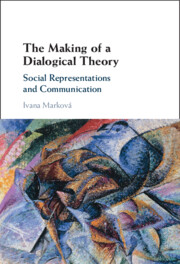Book contents
- The Making of a Dialogical Theory
- The Making of a Dialogical Theory
- Copyright page
- Contents
- Figures
- Acknowledgements
- Introduction
- Part I The Development and Diversification of the Theory of Social Representations and Communication
- Chapter 1 Socio-political Sources of the Theory of Social Representations
- Chapter 2 A Political Refugee in Paris
- Chapter 3 The ‘Age of Intellectual Innocence’ in Psychoanalysis (1961)
- Chapter 4 The Durkheimian in Psychoanalysis (1976)
- Chapter 5 The ‘Great Smoky Dragon’
- Chapter 6 Pseudo-dialogues and Building Bridges
- Part II The Dialogical Perspective of the Theory of Social Representations and Communication
- Afterword
- References
- Index
Chapter 6 - Pseudo-dialogues and Building Bridges
from Part I - The Development and Diversification of the Theory of Social Representations and Communication
Published online by Cambridge University Press: 22 June 2023
- The Making of a Dialogical Theory
- The Making of a Dialogical Theory
- Copyright page
- Contents
- Figures
- Acknowledgements
- Introduction
- Part I The Development and Diversification of the Theory of Social Representations and Communication
- Chapter 1 Socio-political Sources of the Theory of Social Representations
- Chapter 2 A Political Refugee in Paris
- Chapter 3 The ‘Age of Intellectual Innocence’ in Psychoanalysis (1961)
- Chapter 4 The Durkheimian in Psychoanalysis (1976)
- Chapter 5 The ‘Great Smoky Dragon’
- Chapter 6 Pseudo-dialogues and Building Bridges
- Part II The Dialogical Perspective of the Theory of Social Representations and Communication
- Afterword
- References
- Index
Summary
6. Moscovici’s great creativity and capacity to combine ideas from natural and social sciences, literature, and philosophy had a high impact on adopting the theory of social representations and communication internationally, and on the pursuit of Moscovici’s aim to develop a truly ‘social’ social psychology. At the same time, many features of the theory were criticised for their incoherence and for being underdeveloped. Dialogues between Moscovici, his supporters, and adversaries had limited success because the participants followed their own lines of thinking without attempting to understand the other party. In their efforts to apprehend the theory, researchers and students searched for links with other social psychological theories. The search for such bridges was beneficial when it compelled researchers and professionals to reflect on their own perspectives in relation to those of others, to reflect on the use of theoretical concepts, and on methods applied to solving problems. Other bridging attempts were based on less fundamental connections, such as similarities in terminology used in various approaches, or on superficial resemblances. Still other attempts simply used the phrase ‘social representation’ as a substitute for already established notions, for example, ‘attitude’ or ‘opinion’, and so contributed to the routinisation and trivialisation of the theory.
- Type
- Chapter
- Information
- The Making of a Dialogical TheorySocial Representations and Communication, pp. 125 - 150Publisher: Cambridge University PressPrint publication year: 2023



